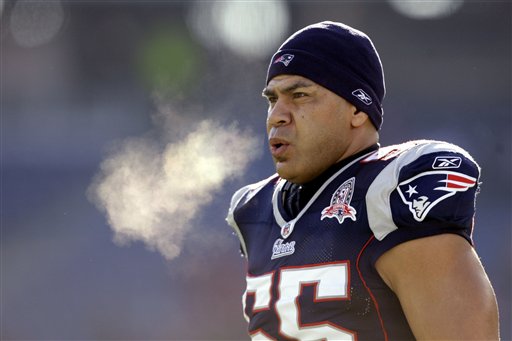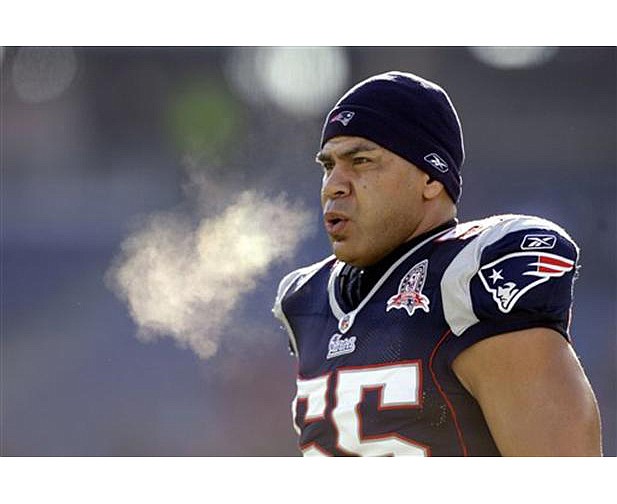 New England Patriots linebacker Junior Seau gets ready before an NFL wild-card playoff game in Foxborough, Mass. The family of Junior Seau has sued the NFL, claiming the former linebacker's suicide was the result of brain disease caused by violent hits he sustained while playing football. The wrongful death lawsuit, filed Wednesday in California Superior Court in San Diego, blames the NFL for its "acts or omissions" that hid the dangers of repetitive blows to the head.
New England Patriots linebacker Junior Seau gets ready before an NFL wild-card playoff game in Foxborough, Mass. The family of Junior Seau has sued the NFL, claiming the former linebacker's suicide was the result of brain disease caused by violent hits he sustained while playing football. The wrongful death lawsuit, filed Wednesday in California Superior Court in San Diego, blames the NFL for its "acts or omissions" that hid the dangers of repetitive blows to the head.Twenty years ago, Junior Seau looked into a camera during the making of an "NFL Rocks" video and said of his most violent pro football tackles, "If I can feel some dizziness, I know that guy is feeling double [that]."
Last summer, the 43-year-old Seau felt such personal pain that he committed suicide, leaving behind an ex-wife and four children who were given instructions to donate his brain to science so researchers could search for what impact all those collisions may have had on his life after football.
The scientific result of those studies revealed what most feared, what far too many former National Football League players are experiencing after retirement -- chronic traumatic encephalopathy, or CTE.
The emotional result of CTE on his family was front and center on Wednesday with news that the Seaus are suing the NFL for "acts of omission" in both ignoring and concealing evidence regarding traumatic brain injuries.
"We know this lawsuit will not bring back Junior," the family said in a statement. "But it will send a message that the NFL needs to care for its former players, acknowledge its decades of deception on the issue of head injuries and player safety, and make the game safer for future generations."
Amen.
This is not to say that there's any way to keep pro football from remaining a dangerous sport as long as it's played by superb, oversized athletes covered in hard armor, often colliding at high speeds.
For the fans, that's much of its allure. Well, that and the billions bet each Sunday on NFL games.
And to a degree, that's OK. No one forces these guys to play. They do it because they both love the game and love the relatively obscene amounts of money they're paid to play it.
But walking around with a bum knee or sore shoulder the last 50 years of your life is not the same as losing your mind before you're 50.
According to The Associated Press, more than 3,800 players have sued the NFL over head injuries in at least 175 cases. More than 100 of those cases have been brought together before U.S. District judge Anita B. Brody in Philadelphia.
Not that the Seaus are content to sue the NFL only. They're also going after helmet manufacturer Riddell, claiming the company was, "negligent in their design, testing, assembly, manufacture, marketing and engineering of the helmets."
Maybe the helmets were flawed and maybe not. But if the NFL did as the Seau lawsuit contends and glorified violent collisions as, "A badge of courage which does not seriously threaten one's health," a jury might deliver the family a favorable verdict.
Especially if Seau's attorneys can further prove, as they allege, "The NFL knew or suspected that any rule changes that sought to recognize that link [between violent play and brain disease] and the health risk to NFL players would impose an economic cost that would significantly and adversely change the profit margins enjoyed by the NFL and its teams."
In other words, the NFL has spent a lot of time over the past two decades doing what most corporations almost always do at the first sign of trouble -- deny, Deny, DENY!
Again, no one made these men play, and certainly no one made Seau appear to relish the act of knocking a man silly.
Still, a civilized society is also supposed to protect us from ourselves whenever possible. It's why we've strengthened and far more seriously enforced DUI laws in recent years. It's why we pull drugs from the shelves when found to be unsafe. It's why every cigarette carton comes with a warning from the Surgeon General.
At the very least, perhaps the NFL should demand a sticker on the back of every helmet that reads, "Using this helmet as a weapon has been found to be extremely hazardous to both your mental health, as well as the person you strike."
But there's another reason to stop this violence, to return to the day when tackling involved wrapping your arms around a guy's waist and dragging him down rather than trying to separate his head from his shoulders.
"The greatest thing [changing tackling rules would do] is changing the way young people play when they start to play tackle football," Archie Manning told ESPN on Wednesday.
"And I think [football] is going to change. I think it's going to be a less violent game in the future. It may not excite the fans as much, but form tackling will improve."
This doesn't mean that the Seaus will or should win their lawsuit. As good a player as Seau was, his delight in bone-jarring tackles near the head is bound to harden a jury against a big settlement.
But as Peyton and Eli's pop -- without question the most beloved figure in Ole Miss football history -- told ESPN, changing this culture is far more important than the thousands of current and former NFL players whose lives have been diminished and destroyed by unnecessary violence.
This is also about helping the game's future stars do more than make their own highlights. It's about ensuring that 20 years after they retire, they'll be able to clearly remember what made them special.
